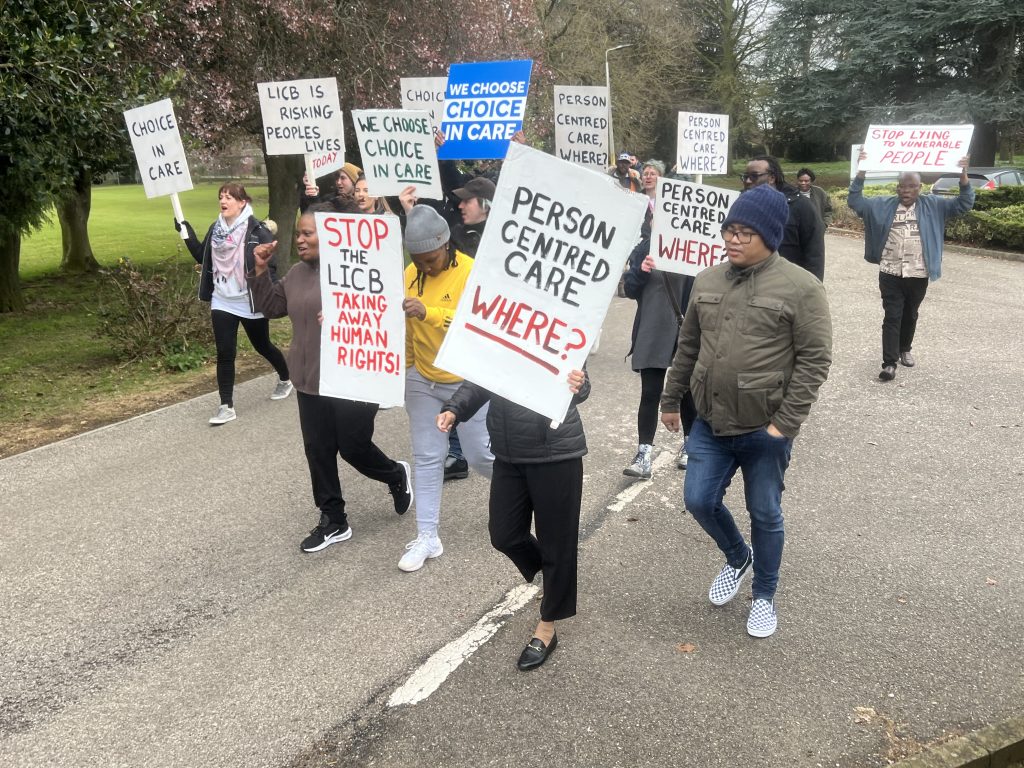Changes to the provision of healthcare to vulnerable people at home prompted a demonstration this week.
Care companies providing NHS-funded continuing care were told that as from this weekend the contracts in Lincolnshire would be going to just one of four companies.
Until the end of this month, up to 70 different providers were being commissioned by the Integrated Care Board for NHS Lincolnshire (ICB) to provide continuing healthcare.
But service users were not told about the changes until they received a letter from the ICB dated last Friday (March 24).
“We are now working with these new providers to be in a position to move packages of care over to the new contracts,” said the letter.
It concluded by saying the changes might take up to three months and the ICB would be in touch with service users again within five weeks.
But care providers currently working with continuing care clients, made their feelings clear by immediately launching a petition and organising a demonstration at the ICB meeting on Tuesday in Sleaford.
“Continuing Healthcare is the means by which clients are released from hospitals nationwide.
“The contract in question enables companies like our own to provide care to end of life and vulnerable individuals out in the community,” said Jacob Ford, of Lincolnshire Home Care, based in Spalding.
“The ICB claims it is creating improvements in the domiciliary care workforce, but intends to collapse small, independent businesses in the process. They are taking away the client’s right to a choice as to where they can receive care from and funnel every individual into a system which is already not coping,” he said.
A letter received by care providers said: “Packages of care that you currently manage on our behalf will be transferred to our new providers in a phased and planned way.”
It adds a request that the companies and their staff “do not discuss the change with individuals or their families.”
Four providers have been nominated to cover seven zones in the county and Spalding has CeraCare – but the letter to clients does not say which provider will be looking after them in the future.
The lack of information to clients is bound to cause worry and stress, says the director of Atlas Care, the lead provider for council-funded care in this area.
“We went through a similar process when we became a lead provider for the county council-funded care, and it is very difficult for clients when things change,” said Philip Claridge.
“Continuing care involves more clinical-type work and staffing can be an issue,” he added.
There are two streams of funding for care at home, one is the NHS and the other is the county council.
It’s the NHS funding system which is changing ‘to improve responsiveness for requests for homecare, to have consistent standard of quality and to build a foundation to create improvements in the domiciliary care workforce,” said a statement from Lincolnshire ICB.
“There will eventually be a time that almost all homecare services are placed with the new providers,” it added.
Some care company staff may be able to transfer to the new provider, but smaller companies could be forced to close as they lose both staff and contracts.
“We will have no choice after working tirelessly through the pandemic to help the NHS,” said Mr Ford.

No choice in who provides care
Vulnerable people who need continuing care in their own homes and are funded by the NHS, will lose any choice in who provides it if the contract changes do come into effect on April 1, according to care staff.
Manager of Spalding’s Lincolnshire HomeCare Jacob Ford says the move will mean service users can only choose one provider for the South Holland area.
The four providers chosen by the Lincolnshire Integrated Care Boards (ICB) may sub contract to other care providers, but those smaller companies run the risk of losing both clients and their business.
“We don’t rely on the NHS-funded continuing health care contracts, but many firms do. And our clients will no longer be able to choose which company they would like to look after them,” said Mr Ford.
He said he and other care providers in the area would do ‘all that is necessary’ to try and overturn the contract changes.
“The integrated care board claim they are creating improvements in the domiciliary care workforce but intend to collapse hundreds of small, independent businesses in the process. They are intending to take away the clients’ right to a choice,” said Mr Ford.
The county’s ICB defended the move and claimed to have involved all the companies, despite Mr Ford receiving an apology for not having received any initial paperwork.
“Market engagement events had been held in the summer of 2022 to share with the market our initial views and to receive feedback and comments,” said the ICB.
But the presentation, seen by the Spalding Voice, allocates 15 minutes for the heading of ‘continuing health care’ and fails to mention the reduction in providers it was looking for.
The opening slide says the event was to ‘begin some dialogue about the market’. The change from clinical commissioning groups to ICBs was also on the agenda.
“Who, when looking for an email regarding tender, would search for ‘engagement events?” said Mr Ford.
“There is a reason that companies like ours exist. We allow carers a choice in where they work and we allow clients a choice in the care they are provided. This choice is being ripped away from them by the integrated care board,” he said.

ICB speaks to protesting carers
Protestors took their placards to this week’s meeting of the Integrated Care Board in Sleaford.
Staff and managers from several companies made their feelings clear and demanded the chance to speak about their fears.
“Finally the board asked seven of us, a representative from each of the companies there, to speak with them about this change in contract,” said Mr Ford.
“There were protestors there from right across the area, including from Derby, Lincoln, Market Deeping and Spalding,” he added.
But they were told that there was nothing the ICB could do at this stage as the changes are due to be made this weekend.
“They insisted that they would try and reassure clients, but we want it overturned,” he added.
The changes will see just one company, Cera Care, given the contract for NHS-funded continuing care in South Holland.
“Unless the staff from other providers are taken on, they won’t be able to cover it. We could lose our staff as well as some of our clients. It’s a disgrace,” said Mr Ford.






